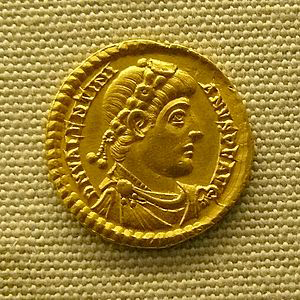Below, abridged translation from the first
volume of Karlheinz Deschner’s Kriminalgeschichte
des Christentums (Criminal History of Christianity)
Solidus of Valentinian I
Rivers of blood under the Catholic Valentinian I
The Catholic Valentinian I (364-375), who resided frequently in Milan and Trier, born in 321 in Cibalae, an important military post in Pannonia, was blond and blue-eyed, diligent, daring and cunning. Officer of the personal guard of Julian, and of forty-three years of age at the time of accessing the throne, he cared little about the dogmas or the disputes of the clergy. But he restored the privileges of the clergy created by Constantine and forbade Christians to be condemned to fight as gladiators. As a puritan Catholic he was, he sanctioned adultery with the death penalty and he himself was a faithful husband (at least with his second wife, Justina, younger than the first).
In a law of November of 364, the emperor provided that judges and officials who had intentionally harmed Christians would be sentenced to death or confiscation of property. In contrast, both Valentinian and Valens were tolerant of the Jews and granted privileges to their theologians. In this way, Valentinian tolerated almost all the sects, and above all showed a surprising indulgence to Auxentius, the Arian bishop of Milan, although on the other hand he was the first Christian emperor to persecute the Manichaeans, arranging against them, in 372, the exile and confiscation of their places of worship; in 373 he made a bloodbath among the Donatists, who had rebelled…
Then the magister militum Theodosius, an Hispanic Catholic and father of the future emperor, was launched against [usurper] Firmus; twice he offered peace through several bishops, and many others broke his promise. The rebellious troops were put to the sword after surrendering, and they could consider themselves lucky those who were saved with only both hands cut. To those thus deceived they had no choice but to fight with the vigour of despair, from which resulted a terrible war, of an unusual cruelty, which ravaged all of North Africa. General Theodosius not only burned alive, or at least mutilated the soldiers who deserted, tired of fighting, but also practiced the tactic of scorched earth over vast territories and exterminated the Mauritanian tribes until he made hundreds of thousands of victims. Once the rebellion was crushed, the pope forbade the celebration of the Donatist cults.
Valentinian, in his capacity as a ‘convinced Christian’ (as Bigelmair, and even Joannou describe him), did not back down from the judicial crime against wizards, fortune-tellers and ‘sex offenders’. His motto: severity and not clemency is the mother of justice. His judges were instructed to proceed harshly, and the benignity of some provisions was more than compensated for by the lack of scruples of many of them. ‘The most elementary principles of justice were mocked by death sentences without proof, or founded on confessions taken away by torture’ (Nagí).
The emperor, the son of peasants, hated the old Roman nobility and had his houses searched for magic recipe books and love filters. Men and women of the best families were banished or executed, and their property confiscated. In his fits of rage, Valentinian ordered executions without blinking; minor faults were punished with the bonfire or the decapitation, the major ones with the death by torture. A page who during a hunting party had released the dogs too soon was whipped to death, and it was not an exceptional case. He never exercised his right of pardon.
The delinquents were sometimes thrown to two she-bears that the sovereign had in cages next to his bedroom. In recent times, Reinhold Weijenborg has tried to refute this anecdote referred to by Amianus by saying that ‘it cannot be true in its literal sense’. So a second reading has been invented, according to which those two cages would be the rooms of the empresses, Marina Severa and Justina.
Theodosius was a ‘great terror of the Saxons’ during the years 368 and 369. He pacified Britannia until the old wall of Adriano following imperial instructions. Theodosius also made frequent raids on the other side of the Rhine. He twice fought against the Alamanni, although during the second campaign they inflicted heavy losses, until their King Vithicab (whose father, Vadomar, had served the Romans in Julian’s time) was killed by some assassins sent by Valentinian. Theodosius also ravaged with the fire and the sword the territories of Franks and Quadics. In 370, he obtained from the Saxons a withdrawal by treaty, to then attack them with treachery and exterminate them.
Emperor Valentinian, who considered himself a peaceful person (a frequent error of perspective among his class and condition), died of a fit of rage. He was parleying with poor Quadics whose king Gabinus, Marcellianus had invited in 374 in his dux Valeriae to assassinate him with a stab in the back during a banquet (see the murder of the king of the Alamanni, which we have just recounted), when having mounted in anger his face became congested, purple, and fell as if struck by lightning. Valentinian had a vomit of blood and died immediately, on November 17 of the year 375, in the border city of Brigetio, being buried in Constantinople.
